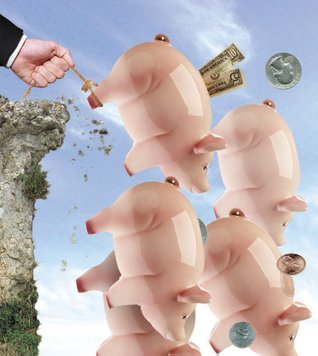Tuesday, Dec. 9, 2008 | 2 a.m.
Sun Archives
- Denny’s makes inroads at Station properties (12-5-2008)
- Harrah’s vice chairman stepping down (12-3-2008)
- Station debt to take bite of workers’ benefit (12-2-2008)
- Earnings drop at Harrah’s, cost cuts to continue (11-7-2008)
Beyond the Sun
With no sign of an economic recovery on the horizon, Station Casinos and Harrah’s Entertainment are bargaining with lenders to help resolve their cash flow problems.
It’s a high stakes poker game: Both companies — loaded up with debt from leveraged buyouts set in motion before the downturn — are determined to stay out of bankruptcy, and lenders are seeking to walk away from the table with as much money as possible.
Although Harrah’s bondholders appear to be cooperating, a majority of Station bondholders are resisting that company’s plan to refinance some of its debt.
Lately, the companies are attempting to capitalize on a decline in bond prices by buying back old notes and exchanging them with new, discounted notes that have extended maturity dates, potentially saving more than a billion dollars in principal and interest.
Although some bondholders are giving companies more time to wait out a recovery, others want more reward for their risk.
Investors holding 66 percent of Station’s publicly traded bonds last week notified the company of their refusal to swap their notes, calling Station’s offer “deficient.”
Station is offering to exchange about $2.3 billion in publicly traded bonds for just over $700 million in new notes trading for about 50 to 20 cents on the dollar — a deal that could reduce the company’s debt by more than $1.4 billion.
Once exchanged, analysts say, these bonds could trade at 9 cents to 29 cents on the dollar, the market value of the old notes. Their value has dropped based on the likelihood of bankruptcy.
Although the new notes would be worth less, in a bankruptcy they would have priority over the existing notes owned by bondholders who didn’t make the exchange.
Harrah’s made a similar offer to its bondholders recently, and many swapped their notes.
Unlike Harrah’s, Station’s owners are sweetening the pot with what sounds like a rich ante: They have offered to pony up $450 million to $500 million to reduce the company’s debt if bondholders agree to the swap.
The offer has strings attached. Unless 82.5 percent of the old bonds are exchanged, the owners’ loan would be ahead of both the old and new bonds in the capital structure. This means that Station’s Fertitta family, which owns about 24 percent of the company, or Colony Capital, the private equity firm that put up the majority of the money in the buyout, would be paid before bondholders in a bankruptcy.
Most bondholders thought they were getting a raw deal, and they’re back at the negotiating table. They might seek more principal, a higher interest rate on their bonds, or a better position in the capital structure, which would benefit them if the worst happens and the company files for bankruptcy.
Analysts say Station will likely default on the company’s bank loans by year’s end because it has too much debt relative to cash flow. That could allow the bank to demand repayment, triggering a filing for bankruptcy protection.
That’s a risk even if the bond exchange is successful because cash is tight, analyst Barbara Cappaert of bond research firm KDP Investment Advisors said.
The bond exchange is no bluff.
The upside for bondholders is that it would reduce debt while giving Station time to recover and a shot at avoiding bankruptcy, Kimberly Noland of research firm Gimme Credit said in a research note to investors last week.
Cappaert added: “They’re trying to buy more time when they need to get a more permanent solution together.”
The Station offer to pay down debt isn’t as rich as the $1 billion cash infusion Las Vegas Sands Chief Executive Sheldon Adelson provided his own company recently. Granted, Adelson had little choice. Some analysts say Las Vegas Sands was more in danger of default than either Station or Harrah’s.
And yet, while Station proffers cash in the form of debt, Adelson’s investment — which involved $475 million in convertible bonds that he converted into stock and another $525 million in stock — was preferable for bondholders because they would be paid before stockholders in a bankruptcy.
Although Harrah’s and Station both risk default because of ballooning debts, Harrah’s has a bit more flexibility than Station these days. Harrah’s has an agreement that allows the company to accumulate more debt without violating the leverage requirements of its banks. Harrah’s also can add the value of future cost savings to its cash flow figures, inflating earnings calculations and keeping the company out of immediate danger of default.
And yet, this is more than a numbers game. It’s a fight for survival, with egos and personalities at play.
That’s a plus for Station, a family-owned company whose executives “have a lot of pride and ego tied up in their success,” Cappaert said.
That’s not necessarily the case with Harrah’s, which is owned by two private equity firms, TPG and Apollo, with countless investors. “We’re not talking about a family’s life’s work” as with Station’s Fertitta family or Adelson, Las Vegas Sands’ founder and majority owner, she said.
Although Station’s latest bargaining chip might have flopped, the company might not be putting its best offer on the table just yet. A slight improvement in the economy, however minor, might allow the company to refinance debt on more favorable terms.
“They’re taking a real gamble. It’s like playing poker with the capital markets,” Cappaert said.


Join the Discussion:
Check this out for a full explanation of our conversion to the LiveFyre commenting system and instructions on how to sign up for an account.
Full comments policy